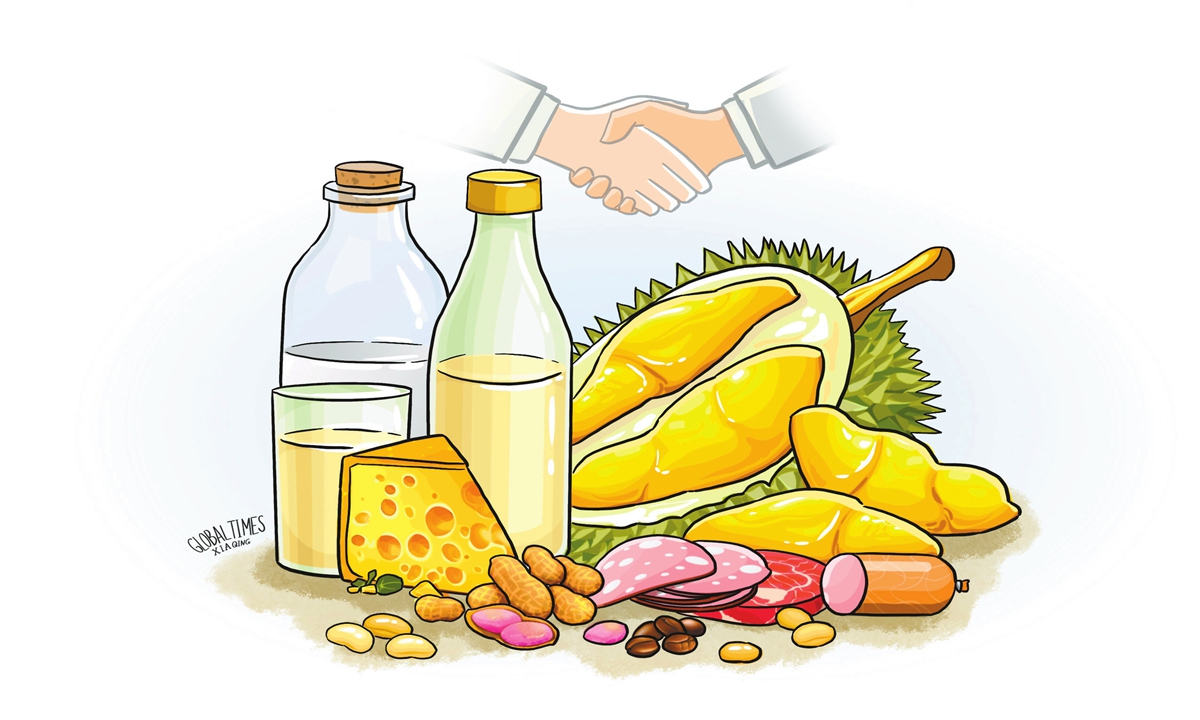CIIE showcases global benefits of China’s diverse agricultural imports

(Illustration: Xia Qing/GT)
The food and agricultural products exhibition area of the 7th China International Import Expo (CIIE) in Shanghai, which will run from Tuesday to Sunday, has expanded compared with the 6th CIIE. More than 1,500 companies from more than 100 countries and regions will showcase various agricultural and food products, according to the official website of the trade fair.
Among these, the area for African products has been further expanded, showcasing African agricultural products such as meat, coffee, and soybeans, and promoting the entry of more African products into China's vast market.
The expansion of the agricultural products exhibition area at the CIIE underscores China's commitment to diversifying and enhancing the inclusivity of its agricultural product imports. In the face of uncertainties in the international trade landscape, China will continue to promote greater openness, actively expand imports, and create significant market dividends for the world.
In the context of international food and agricultural product trade being disrupted by regional conflicts, trade protectionism, and other factors, China continues to deepen its trade cooperation with more countries around the world, promoting the diversification of import sources and product categories.
From agricultural sources like the US to emerging market countries such as those in Africa and Latin America, China's agricultural product import market is continuously expanding. This diversification not only helps ensure China's food security but also injects new vitality into global agricultural trade and the economic development of more developing countries.
For instance, the sources of soybean imports have evolved from being highly concentrated in the US to multiple countries, including Brazil, the US, Argentina, and others.
Over the last five years, 73 percent of Brazil's soybean exports headed to China, versus a 51 percent average for the US, according to data from the Farmdoc Daily at the University of Illinois in the US in February.
This year's CIIE provides support for 37 least developed countries (LDCs) to participate in country exhibitions and business exhibitions, and further expands the exhibition area for African products in the food and agricultural products exhibition, in an effort to help more developing countries take part in the universally beneficial and inclusive economic globalization, Foreign Ministry spokesperson Lin Jian noted on last Friday.
For a long time, China has placed great importance on promoting imports of high-quality specialty agricultural products from Global South countries.
As of the end of August, China had signed 22 protocols on the import of agricultural products with 14 African countries. At the 2024 Summit of the Forum on China-Africa Cooperation, China expressed its willingness to proactively expand market access, deciding to offer zero-tariff treatment on all products from the LDCs that have diplomatic relations with China, including 33 African countries, thereby turning China's large market into a significant opportunity for Africa.
Boosted by platforms such as the China-Africa Economic and Trade Expo, China has maintained its position as Africa's largest trading partner for 15 consecutive years and become the second-largest destination for African agricultural product exports. China's imports of agricultural products from Africa have increased for seven consecutive years.
Customs data show that in the first seven months of this year, China imported 25.35 billion yuan ($3.57 billion) of agricultural products from Africa, a rise of 7.2 percent year-on-year, which was higher than the overall growth rate of China's agricultural product imports.
As China further promotes trade liberalization and facilitation measures with more developing countries, the costs for these economies to export agricultural products to China will continue to decrease. Enhanced trade cooperation between China and these countries in the agricultural sectors will support the development of agricultural supply chains and increase the added value of products in these countries, thereby promoting the sustainable agricultural and economic development of these countries.
Photos
Related Stories
Copyright © 2024 People's Daily Online. All Rights Reserved.









